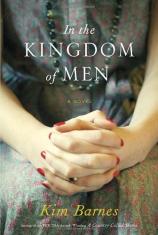Reading Group Guide
Discussion Questions
In the Kingdom of Men

1) Gin and Mason McPhee meet in Oklahoma and then move to Saudi Arabia. On the surface these locations seem quite different. What aspects of the two cultures do they discover to be surprisingly similar?
2) How does Gin’s upbringing inform her life in Saudi Arabia?
3) What aspects of the “middle class American dream” that Gin discovers inside the Aramco compounds most interest or surprise you?
4) Why do you think the author set the story in the mid-to-late 1960s?
5) Do you think that you could have lived inside the Aramco compounds in 1967? What about today?
6) Have you ever felt the need to rebel against something or someone you found to be unjust? What consequences were you willing to face?
7) How does the communication between the husbands and wives reflect the era of the 1960s? Do you think much has changed? Why or why not?
8) Of all the representations of bigotry and oppression that are represented in the novel, which one hit you hardest?
9) Do the sometimes bawdy conversations between Gin, Ruthie, and Linda surprise you? Have you ever had friends like Ruthie and Linda?
10) In the Kingdom of Men has been described as a “female bildungsroman.” What other female coming-of-age
novels can you think of?
11) Do you see Gin McPhee as a heroine? Why or why not? Do you think of her as tragic?
12) Given the restrictions of time and place, if you had been Gin, what would you have done differently?
13) At what point in the story were you most afraid for Gin?
14) What power do the American women have in the compounds? What power do the Bedouin women have in the tents?
15) How does Gin's reaction and response to the foreign Arab culture and treatment of women reflect current day values and reactions in the US?
16) Did you find yourself being angry with any of the characters? Who and why?
17) If this story represents “the education of Mrs. Gin,” Gin has many teachers along the way. What does Gin learn from Ruthie and Linda? What does she learn from Yash, Abdullah, and Carlo?
18) Did you think that Gin and Abdullah were in love? Did you find yourself wanting them to be together?
19) What role does food play in the story? Of the meals described in the book, which was your favorite?
20) What are your thoughts on how cultures use (or misuse) religion to control the actions of women? Of men?
21) The book’s title, IN THE KINGDOM OF MEN, has many different connotations. Why do you think the author chose this
title?
22) What did you learn about Saudi culture that you might not have otherwise known?
23) How does the development of the oil fields parallel the settling of the American West?
24) Do you agree with Mason that the best thing for the Saudi workers was for the company to be nationalized (as it was in 1980)?
25) Why do you think real-life Aramcons feel such love and nostalgia for their time spent in Saudi Arabia?
26) Do you agree with Yash’s statement that Aramco’s presence in Saudi Arabia represents corporate colonization?
27) In Abdullah and the young Arab men who protested during the Six Day War, we see the beginnings of political resentment and discontent. Do you think that the United States is still feeling the backlash of that resentment? How so?
28) Like Gin and Mason, many people who came to work for Aramco were catapulted from lower class to upwardly mobile middle class, and their children, who might not otherwise have gone to college, ended up at some of the most prestigious boarding schools and universities in the world. Can you think of other historical periods and events that had this same effect?
29) Do you agree with Lucky Doucet that some people are good and some people are bad, no matter their culture or race?
30) The book’s conclusion leaves a number of questions unanswered. If you could keep writing the story past its present ending, what would you have happen next?
31) If you could save one life in this story, whose life would it be?
In the Kingdom of Men
- Publication Date: May 29, 2012
- Genres: Fiction, Historical Fiction
- Hardcover: 336 pages
- Publisher: Knopf
- ISBN-10: 0307273393
- ISBN-13: 9780307273390








